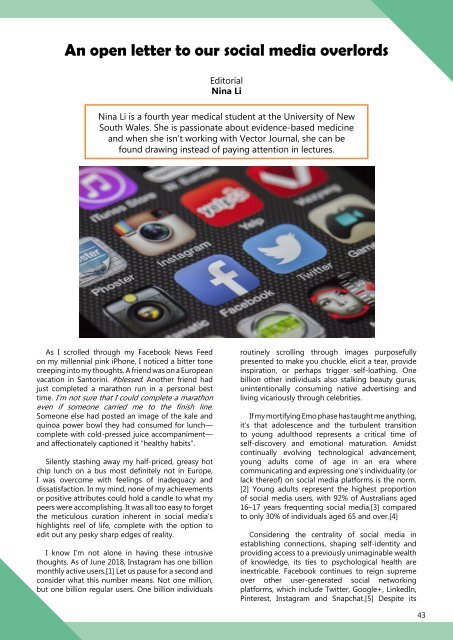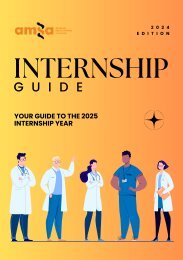Vector Volume 12 Issue 2 - 2018
Create successful ePaper yourself
Turn your PDF publications into a flip-book with our unique Google optimized e-Paper software.
An open letter to our social media overlords<br />
Editorial<br />
Nina Li<br />
Nina Li is a fourth year medical student at the University of New<br />
South Wales. She is passionate about evidence-based medicine<br />
and when she isn’t working with <strong>Vector</strong> Journal, she can be<br />
found drawing instead of paying attention in lectures.<br />
As I scrolled through my Facebook News Feed<br />
on my millennial pink iPhone, I noticed a bitter tone<br />
creeping into my thoughts. A friend was on a European<br />
vacation in Santorini. #blessed. Another friend had<br />
just completed a marathon run in a personal best<br />
time. I’m not sure that I could complete a marathon<br />
even if someone carried me to the finish line.<br />
Someone else had posted an image of the kale and<br />
quinoa power bowl they had consumed for lunch—<br />
complete with cold-pressed juice accompaniment—<br />
and affectionately captioned it “healthy habits”.<br />
Silently stashing away my half-priced, greasy hot<br />
chip lunch on a bus most definitely not in Europe,<br />
I was overcome with feelings of inadequacy and<br />
dissatisfaction. In my mind, none of my achievements<br />
or positive attributes could hold a candle to what my<br />
peers were accomplishing. It was all too easy to forget<br />
the meticulous curation inherent in social media’s<br />
highlights reel of life, complete with the option to<br />
edit out any pesky sharp edges of reality.<br />
I know I’m not alone in having these intrusive<br />
thoughts. As of June <strong>2018</strong>, Instagram has one billion<br />
monthly active users.[1] Let us pause for a second and<br />
consider what this number means. Not one million,<br />
but one billion regular users. One billion individuals<br />
routinely scrolling through images purposefully<br />
presented to make you chuckle, elicit a tear, provide<br />
inspiration, or perhaps trigger self-loathing. One<br />
billion other individuals also stalking beauty gurus,<br />
unintentionally consuming native advertising and<br />
living vicariously through celebrities.<br />
If my mortifying Emo phase has taught me anything,<br />
it’s that adolescence and the turbulent transition<br />
to young adulthood represents a critical time of<br />
self-discovery and emotional maturation. Amidst<br />
continually evolving technological advancement,<br />
young adults come of age in an era where<br />
communicating and expressing one’s individuality (or<br />
lack thereof) on social media platforms is the norm.<br />
[2] Young adults represent the highest proportion<br />
of social media users, with 92% of Australians aged<br />
16–17 years frequenting social media,[3] compared<br />
to only 30% of individuals aged 65 and over.[4]<br />
Considering the centrality of social media in<br />
establishing connections, shaping self-identity and<br />
providing access to a previously unimaginable wealth<br />
of knowledge, its ties to psychological health are<br />
inextricable. Facebook continues to reign supreme<br />
over other user-generated social networking<br />
platforms, which include Twitter, Google+, LinkedIn,<br />
Pinterest, Instagram and Snapchat.[5] Despite its<br />
43

















